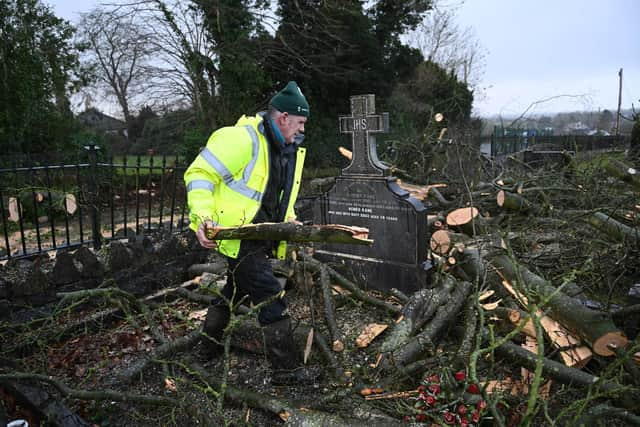NFU Mutual urges farmers to prepare for further rain and strong winds ahead of Storm Jocelyn’s arrival
and live on Freeview channel 276
Storm Isha has seen fallen trees, branches and debris causing damage to vehicles and machinery as well as flooded roads and widespread power outages disrupting farm work and transport routes.
And with forecasts of further rain and heavy winds with the arrival of Storm Jocelyn on Tuesday 23 and Wednesday 24 January, there are currently over 150 flood alerts and warnings in place across the UK.
Advertisement
Advertisement
NFU Mutual Rural Affairs Specialist, Hannah Binns, said: “Isolated rural farms, dwellings and communities are more at risk from extreme weather, and with severe gales expected to accompany the high levels of rainfall following Storm Isha and the arrival of Storm Jocelyn, we urge everyone to plan ahead and take care if working outside.


“Safety for farmers, family members and workers should always be the number one priority and while fully understanding the pressures farmers are under, it is vital they avoid taking risks which could lead to injury or fatalities.
“Farmers can consider moving livestock to higher ground to protect them from flood water as well as moving machinery and electrical items.
“For those working alone, it is important they tell someone where they will be and what time they should be back as well as carry a charged mobile while working outside and use the What3Words app to help provide a location in the event of an emergency.
Advertisement
Advertisement
“It is also worth checking alternative fuel and power sources in case of a power cut or disruption, such as making sure generators are in working condition and able to run at full load for long periods of time.”
NFU Mutual has a network of more than 280 Agency offices who know their communities and are on standby to progress repairs after the storms, including making emergency payments and settling simpler claims immediately.
“We also work closely with agricultural specialist loss adjusters, so we are able to quickly deploy people who understand your business,” Hannah added.
Protecting yourself and your farm in a storm
Before the storm :
- Stay alert for Met Office weather warnings.
- Regularly inspect your farm and keep on top of maintenance by carrying out necessary repairs to buildings, fences and walls whilst the weather is calm.
Advertisement
Advertisement
- Check that tiles, slates, and roofing sheets are in place and put away any items that cannot be secured.
- Avoid being near barn doors if there are high winds.
- Make sure gutters are not leaking and are clear of leaves and other debris.
- Protect and lag water pipes in vulnerable areas and know where the water supply is so that you can turn it off in the event of burst pipes.
- Ensure you have a good tree inspection programme in place, paying particular attention to trees bordering buildings, roads, railway lines and rights of way.
Advertisement
Advertisement
- Prepare for power cuts: have torches and batteries to hand and make sure any generators are ready to use if required.
- Plan evacuation routes to get staff and livestock to safety in the case of extreme weather such as floods – identify higher ground that you can move livestock to in event of flooding.
- Have your insurer’s emergency helpline available.
During the storm:
- Do not leave the house or make journeys unless absolutely necessary.
- If you need to leave the house, avoid the sheltered side of walls when walking.
Advertisement
Advertisement
- If journeys are essential, drive slowly and carefully, staying aware of high winds on exposed roads and ice and water on the road.
- Do not attempt emergency repairs during the storm.
- Keep all building doors and windows closed.
After:
- Be aware after a storm or weather event, power cables or powerlines may have been brought down.
- Don't enter any buildings that could be unsafe following a storm.
- Report any damage to your insurer as soon as possible.